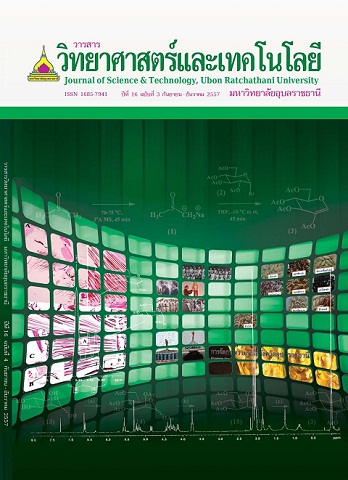คุณสมบัติโปรไบโอติกของแบคทีเรียกรดแลคติกที่คัดแยกได้จากอุจจาระเด็กแรกเกิด
Main Article Content
บทคัดย่อ
การศึกษาครั้งนี้มีวัตถุประสงค์เพื่อศึกษาคุณสมบัติโปรไบโอติกของแบคทีเรียกรดแลคติกจำนวน 180 ไอโซเลต ที่คัดแยกได้จากอุจจาระของเด็กแรกเกิด คุณสมบัติโปรไบโอติกที่ศึกษา ได้แก่ การย่อยสลายเม็ดเลือดแดงของคน การทนต่อสภาวะที่พบในระบบทางเดินอาหาร ได้แก่ การทนกรดและเกลือนํ้าดี การตรวจหายีนที่เกี่ยวข้องกับความรุนแรงของการก่อโรค และการจำแนกชนิดแบคทีเรีย ผลการศึกษาพบว่า มีแบคทีเรียกรดแลคติกที่มีคุณสมบัติเป็นโปรไบโอติก จำนวน 4 ไอโซเลต คือ KM1-CMP3, KM2-CMP4, KM2-CMP11 และ KM3-CMP2 โดยทุกไอโซเลตไม่ย่อยสลายเม็ดเลือดแดงของคน สามารถทนต่อสภาวะความเป็นกรดและสภาวะที่มีเกลือนํ้าดีซึ่งทุกไอโซเลตมีเซลล์ที่รอดชีวิตมากกว่า 80 % ผลการตรวจหายีนที่เกี่ยวข้องกับความรุนแรงของการก่อโรคพบว่า แบคทีเรียกรดแลคติกทั้ง 4 ไอโซลเลต ไม่มียีน cytolysin A และ gelatinase E ผลการจำแนกชนิดแบคทีเรียโดยวิธีการเพิ่มจำนวนและตรวจสอบลำดับเบสของยีน 16S ribosomal RNA พบว่า เชื้อแบคทีเรียกรดแลคติกทั้ง 4 ไอโซลเลต เป็นเชื้อ Enterococcus faecalis ดังนั้น เชื้อเหล่านี้จึงเหมาะสมที่จะนำไปทดสอบความเป็นโปรไบโอติกในขั้นต่อไป ได้แก่ การทดสอบกับเซลล์เพาะเลี้ยงและสัตว์ทดลอง
Probiotic Characterization of Lactic Acid Bacteria Isolated from Infant Feces
This study aimed to characterize the probiotic properties of 180 lactic acid bacteria (LAB) from infant feces. These properties included hemolysis, survival in simulated gastrointestinal tract conditions (acid and bile salt tolerance), detection of virulent-associated genes (cytolysin A and gelatinase E), and bacterial strain identifi cation. The results found that four isolates, KM1-CMP3, KM2-CMP4, KM2-CMP11, and KM3-CMP2, demonstrated good probiotic properties. These four isolates were negative for hemolysis activity and were able to survive in acidic (after 3 h exposure to gastric juice pH3.0) and bile salt conditions (after 24 h exposure to 0.3% Ox gall) with more than 80 percent of cells surviving. The four isolates did not carry any virulent-associated genes. Bacterial strain identifi cation by 16S ribosomal RNA amplifi cation, sequencing, and comparison found that the four isolates were identifi ed as Enterococcus faecalis. Therefore, these E. faecalis strains can be further used for the probiotic characterization in cell cultures and animal models.
Article Details
บทความที่ได้รับการตีพิมพ์เป็นลิขสิทธิ์ของ วารสารวิทยาศาสตร์และเทคโนโลยี มหาวิทยาลัยอุบลราชธานี
ข้อความที่ปรากฏในบทความแต่ละเรื่องในวารสารวิชาการเล่มนี้เป็นความคิดเห็นส่วนตัวของผู้เขียนแต่ละท่านไม่เกี่ยวข้องกับมหาวิทยาลัยอุบลราชธานี และคณาจารย์ท่านอื่นๆในมหาวิทยาลัยฯ แต่อย่างใด ความรับผิดชอบองค์ประกอบทั้งหมดของบทความแต่ละเรื่องเป็นของผู้เขียนแต่ละท่าน หากมีความผิดพลาดใดๆ ผู้เขียนแต่ละท่านจะรับผิดชอบบทความของตนเองแต่ผู้เดียว


